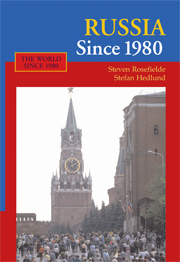Book contents
- Frontmatter
- Contents
- List of Figures, Tables, and Boxes
- Acronyms
- Timeline
- Preface
- Acknowledgments
- Introduction
- PART I RUSSIA BEFORE 1980
- PART II GORBACHEV
- 3 Pandora's Box
- 4 Blindman's Bluff
- 5 Squalid Superpower
- PART III YELTSIN
- PART IV PUTIN
- PART V ADVANCE AND RETREAT
- PART VI PROSPECTS
- Conclusion
- Glossary
- Bibliography
- Index
- References
5 - Squalid Superpower
Published online by Cambridge University Press: 05 June 2012
- Frontmatter
- Contents
- List of Figures, Tables, and Boxes
- Acronyms
- Timeline
- Preface
- Acknowledgments
- Introduction
- PART I RUSSIA BEFORE 1980
- PART II GORBACHEV
- 3 Pandora's Box
- 4 Blindman's Bluff
- 5 Squalid Superpower
- PART III YELTSIN
- PART IV PUTIN
- PART V ADVANCE AND RETREAT
- PART VI PROSPECTS
- Conclusion
- Glossary
- Bibliography
- Index
- References
Summary
Muscovite tsars and communist leaders always promised that their martial police states would promote the greater social good. Autocratic rent-granting was presented not as a curse but as a blessing that would empower Russia to catch up with and overtake the developed West. It might be supposed that those taking the long view would summarily dismiss such posturing, but this wasn't the case. Economic historians tend to accept Muscovite claims of extraordinarily rapid industrial growth spurts both before and after the Bolshevik epoch. Table 5.1 presents Angus Maddison's comparative GDP (gross domestic product) and per capita GDP growth estimate for the tsarist period valued in 1990 U.S. dollars. Although, Russia's performance was subpar on both measures, its industrial component was much better. The consensus of the CIA, academics, and the Communist Party of the Soviet Union was that despite the Bolsheviks' criminalization of business, entrepreneurship, and private property, and Hitler's occupation, the USSR more than held its own vis-à-vis the developed West (1921–89).
Was this Soviet era consensus correct? And if so, does it imply that post-Yeltsin Muscovy may prosper and westernize?
Comparative Size: The Soviet Era Consensus
Economic historians estimate that tsarist GNP (gross national product) on the eve of the Bolshevik coup d'etat was approximately 30 percent of America's. Seventy-two years later, after tumultuous wars, and depressions both the CIA and official Soviet statistics reported that the gap had been dramatically reduced. Soviet GNP in 1989 had risen to 67 percent of the American level.
- Type
- Chapter
- Information
- Russia Since 1980 , pp. 78 - 92Publisher: Cambridge University PressPrint publication year: 2008



